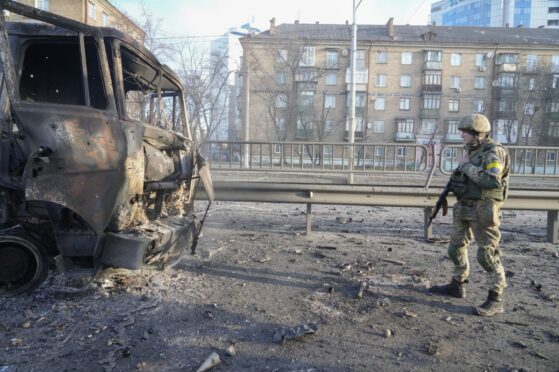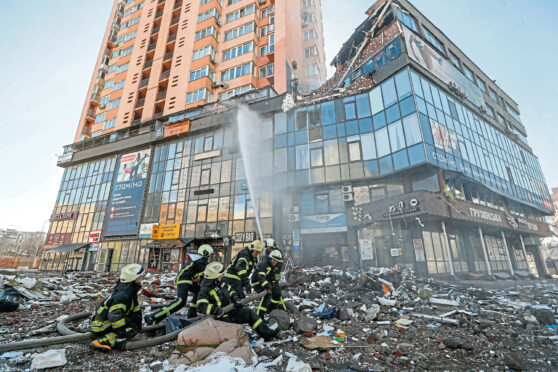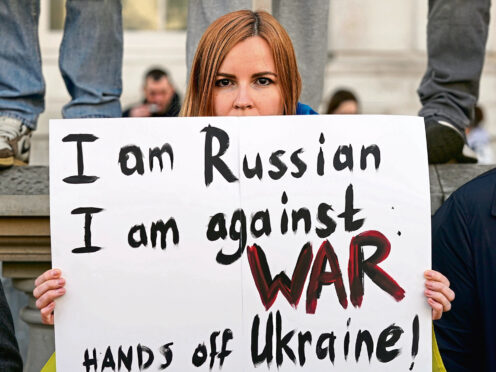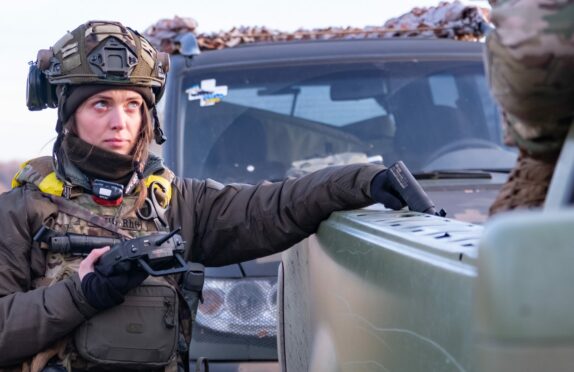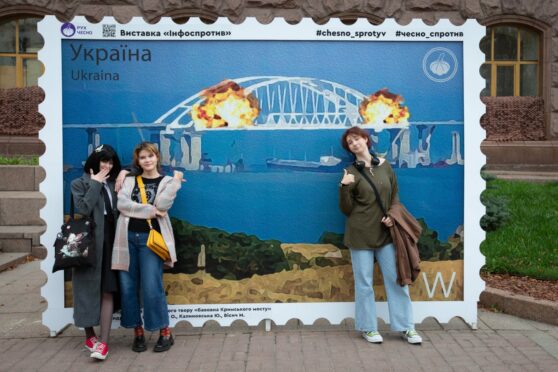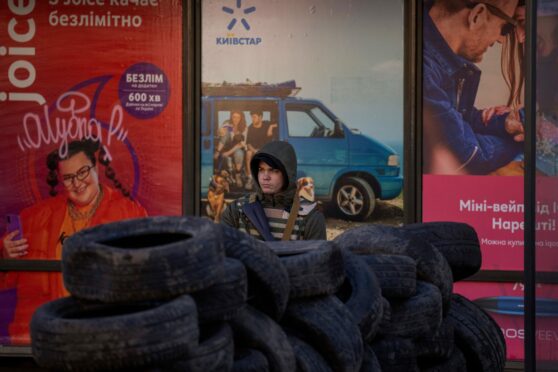
Natalia bumped into her father queuing up to join the army to defend his country from the invading Russian forces.
“I said: ‘Father you can barely walk, how can you fight?’ He said ‘If I cannot walk, I will crawl. I must defend my country’,” she said.
If Vladimir Putin was expecting to crush Ukraine easily, the Russian President badly under-estimated the defiance of its people.
In a video, a middle-aged man was seen telling off a line of Russian soldiers in the city of Melitopol, which is about 22 miles from the Azov sea coast.
“Grandpa is reprimanding the Russian soldiers like they are children. ‘I am also Russian. Don’t you have any problems at home?’,” Tweeted one commentator.
Another Ukrainian drove up to the crew of a Russian tank that appeared to have broken down and asked its crew: “Have you broken down? Can I tow you back to Russia?”
When the Russian soldiers laugh, he tells them that Kyiv is fine and that many Russian soldiers have surrendered. In the same video, which went viral on social media, the man drove off and came across another broken-down tank.
Television pictures showed Ukrainians queuing up to give blood to help in hospitals as the battle was expected to intensify. In other places, citizens brought food, drinks, blankets and other vital supplies to help its army in Kyiv.
In the eastern city of Dnipro, crowds were gathering to put together makeshift Molotov cocktails to defend their homeland against the tanks and cruise missiles of the Russian army, which has 13,000 tanks at its disposal. They picked up Styrofoam to attach to the bombs so that they will stick more easily to Russian troops or armour.
The men and women making the makeshift bombs were following instructions from the Ukrainian government. The Defence Ministry, which has handed out 25,000 arms to its citizens in Kyiv, has also instructed its people to switch road signs to confuse the Russian military.
Back in Kyiv, they were making Molotov cocktails too. The Financial Times spoke to Mykahyalo, one of several hundred men queuing at a military enlistment office looking for guns. He had 60 bottles that might be used for home-made bombs “to, you know, greet the Russians, a big cocktail party. A buddy of mine is getting processed machine oil to serve to the Russians”.
Despite the fighting in the streets across Ukraine, there was hope in the shelters below ground.
A baby girl was born on Friday night among the chaos of people sheltering in the Kyiv metro.
The 23-year-old mother gave birth to Mia among neighbours and others sheltering for their lives in the underground system.
Others sheltering in the metro from the threat of Russian cruise missiles hailed Mia’s birth as a “beacon of hope”.
Ukraine’s Centre for Strategic Communications and Information Security said in a statement: “A couple of hours ago, a woman gave birth in the Kyiv subway. This news is what gives us hope.”
A baby boy was delivered in the basement of a Kyiv hospital after other parts of the hospital were damaged in an attack.
A doctor said: “In conditions, far from those who deserve a new life, the voice of a newborn. It’s a boy.”
As men aged 18-60 are prohibited from leaving the country because they may be conscripted to fight, some Ukrainians are handing their children to strangers and asking them to take them to safety.
Nataliya Ableyeva, 58, took two children over the border into Hungary after a man she had never met approached her at the border and asked her to take his children to safety. “This man came up to me and he pleaded with me to take his children to safety. I have a piece of paper with his mobile number on and that is it,” she said.
A terrified but defiant child sent a message to British charity workers saying if Nato would protect the skies above Ukraine “we will do the rest”.
“The families living near Korosten have messaged us desperate for help,” said Michael Lafferty, a trustee of the Chernobyl Children’s Lifeline charity, which was formed after the 1986 nuclear disaster in the Ukrainian city.
“One family with young children hiding in a cellar told us they could hear bombs going off not too far off and the ground shook. They are frightened, doing what they can to stay safe.”
He added: “Then another child sent a message pleading for us to ask Nato to protect their skies. ‘We will do the rest’.”
Dennis Vystavkin, the chief executive of the charity, said: “They send pictures of what food and water they have left, what they have to survive on.
“The shops sold out last week and this is all they have to survive on. We are desperately wondering what we can do to get vital supplies to them in an area which is now a war zone.”
Ukrainians around the world have been watching events unfold in the country as their families try to escape the carnage. Yana, a student at a Madrid university, told The Sunday Post: “My sister is in Kyiv. She is leaving the city to hide in a house with her friends. Very scary situation. My grandma is in Donetsk, she is safe. We are holding on.”
Sean Cusick, from Glasgow, was sheltering in a neighbour’s home in eastern Ukraine where he was stranded with his wife Chloe and two-year-old son.
Cusick said he had no money nor any way to get out.
“Our neighbours have a basement that is being used as a shelter and, as it is only three metres from our house, we are able to get there quickly if we hear anything – and that is often,” he said.
“Our bags are packed to run at any moment. Kyiv is very bad. Kharkov has had a few explosions. I have to run now. Going to the shelter now.”
The couple were reunited last October after some time apart. They married a month later and have been in the process of getting Chloe’s travel documents to leave Ukraine so she can live in Scotland.
She does not have a valid national ID or passport. They contacted the Scottish and UK governments to ask for help as tensions between Ukraine and Russia worsened.
Like thousands of other Ukrainians, she may well be heading to Scotland soon.

Enjoy the convenience of having The Sunday Post delivered as a digital ePaper straight to your smartphone, tablet or computer.
Subscribe for only £5.49 a month and enjoy all the benefits of the printed paper as a digital replica.
Subscribe